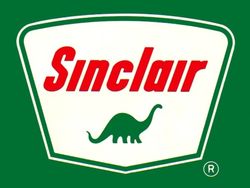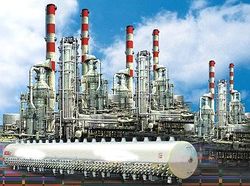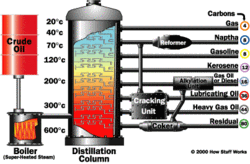
This is a story of conservation and content. The story is in the refineries.
The gas you use in winter is different from what you use in summer. It's different depending on where you live.
Gas used in the winter contains a lot of butane. Butane is cheap, but it turns to gas at about the melting point of water. That's why your gas cap has a “vapor lock” – it's trying to trap the gases in the gas in the tank, so they can be used, rather than blow away and be wasted.
What replaces butane in summer gas? Mainly ethanol. Alcohol. It can be made in the refining process, or it can be made in other ways. Ethanol costs more than butane. Some people pay as much as $250/gallon for it – if it's properly aged in the right barrels. But even the cheapest ethanol has a price higher than that of butane.

The chemicals added for California and other urban places to help gasoline burn cleaner cost money. More money than butane.
Where does conservation enter into it? Demand falls as people conserve. Buy a smaller car, drive a little less, you use less gas. So does everyone. When falling demand hits an industry, margins get squeezed, and companies go out of business. A lot of refining capacity has been taken off-line the last several years. More may follow.
Now add global warming. Refineries have to guess when it will warm up, so they can change their blends to meet demand. This winter has been very warm in the U.S. I haven't seen a single snowflake in Atlanta, and there was only one multi-day freeze to protect the trees from insects. (Trees will die.) Point is, the formulation has to change earlier, and a refinery that has to re-tool for that has to spend money before it wants to.

There is no quick fix. Drill, baby drill has delivered us a glut of natural gas, with prices half what they were a few years ago. Even Warren Buffett got caught out. But oil, and gas liquids, are only a part of the gas price equation.
We can produce more alcohol, for less. We can make it out of things other than food, which is called cellulosic alcohol. We can make it from algae. Scaling these efforts will help, but we're talking about something that's research intensive, capital intensive – it takes time.
We can also continue to conserve. I'm paying less than $10/week for gas, because I got a small car, I live intown, and I combine trips. Using less gas is money in your pocket. A smaller car pays for itself. Telecommuting and car-sharing save money. Bicycles, even electric ones, are fun. That won't have a big price impact, but it will be good for your own profit-and-loss statement. So shut up and do it.

It will be solved by us. As we adjust our habits to deal with high gas prices, we'll find we don't care as much about gasoline, that there are better places to spend money, and the opportunity in fuel will create new solutions over the next decade.










new phone line
Dana Blankenhorn: Why Gas Prices Are Rising
replace
Dana Blankenhorn: Why Gas Prices Are Rising
dating advice
Dana Blankenhorn: Why Gas Prices Are Rising